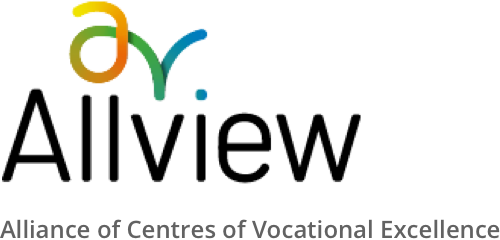The ALLVIEW project is a new transnational cooperation platform that connects partners within the wood and furniture sector, with operational objectives on a regional, national and European level. With the ALLVIEW project, we aim at an innovative approach to modernise vocational education and training.
The three main pillars are:
- circular economy
- industry 4.0
- AAL (active assisted living)
Teacher mobility is part of the Allview project. In the week of October 10 to 14, HMC provided a programme around the Allview themes for eight teachers from Italy: 4 from Northern Italy and 4 from Southern Italy.
Some activities that where realised are:

During the workshop “making VR instructions”, the participants were taught how to use Simlab Studio 10 software. This allows 3D models to be made interactive in a VR environment. Step-by-step, the participants made instructions on how to drive a nail into a block of wood with a hammer. In between, the VR-environment was uploaded to the VR glasses that could be used for testing

Presentation on Active Assisted living (AAL) using sensor technology. AAL is all about helping the elderly and people with disabilities to live independently for as long as possible. There are opportunities here for the wood and furniture industry. Think of the processing of sensors and chips in furniture with which data can be collected. For example, about a person’s health and/or movement pattern. During the workshop, the teachers made their own business card with a built-in NFC chip. This allows contact details to be quickly read on a mobile phone and thus shared with someone else.

Workshop Material Footprint at Broeinest, a materials library and meeting place for interior architects, designers and makers. During the interactive sessions, we analyzed the concept of sustainability and assessed various materials. The discovery was that sustainability is not only about the composition of the material, but that it depends on the use, the value, the desired lifespan. As a designer it is important to provide insight into which values are important in the design and to make responsible choices based on this. In addition, they were given teaching methods that they can use in the lessons with students.

Participants were given the opportunity to present and explain what they thought was the most sustainable material. Guilty pleasures in terms of materials were also shared.
Presentation Baars & Bloemhoff
Sustainability manager Remko Roest talked about the company’s sustainable ambitions at Broeinest. As a major supplier of sheet material, they want to include sustainable, circular and biobased alternatives in the range as much as possible.
Also were organised Company visits

Introduction to sustainable materials and design in the company Fiction Factory. The sustainability manager, Marije Remigius, presented their very holistic approach on sustainability; all aspects of the business operations have been scrutinized and developed, from choices in use of material to staff wellbeing, to what is served in the canteen. Sustainable projects such as designing with ‘waste’ and a colour code system to classify materials on a sustainability scale were also discussed. Finally, we visited Wikkelhouse, part of Fiction Factory that develops sustainable small houses made by wrapping cardboard and glue.

Visit to ship interior builder Woodies at Berlin located in the north of Amsterdam. Refurbishing houseboats has a sustainable character and keeps the craft in the city. In addition, Woodies imports coffee beans from Columbia via its own sailing ship (energy-efficient). Finally, Woodies contributed to the creation of de Ceuvel: a place where discarded houseboats are reused and serve as an office or creative breeding ground.

Visit to the Rotterdam Makers District, the region’s place for the innovative manufacturing industry. The area combines living, working, making and learning.

Visit to the RDM Innovation Dock. Entrepreneurs and education meet in an industrial hall with an area of 23,000 m2. They find each other through the innovatieconnector for graduation research and innovative projects.

For example, a newly developed wind turbine for ‘small wind’ was on display at the Innovation Dock: the ‘flower turbine’. In addition, many more innovations were on display. Think of a 3D-printed coral reef to restore nature in the ocean.
The teachers also have the opportunity to visit some interesting school:

Tour through the Wood and Furnishing College in Amsterdam and Rotterdam. Including a visit to the study centre, Lab and the machinery. The teachers were impressed by the facilities available to students, such as the CNC machines, the laser cutter the 3D printers.

Introduction to the way in which sustainability is incorporated in the curriculum. At HMC Circustek residual materials from the industry are for sale at a reduced rate for students. Compulsory workpieces are made from this. We also work with native wood. Sustainability is an important spearhead. It is included in the curricula of all courses.
Also cultural activities were very important:

Bicycle tour along monumental trees in Amsterdam. The city has been planting trees for over 400 years. Today, the city has circular ambitions. By 2030, the city wants to use 50% less new raw materials. By 2050, the city wants to be fully circular.

An introduction to Dutch Shipbuilding in the time of the VOC in Het Scheepvaartmuseum. In 1600, the Netherlands already had about 1900 ships that sailed at sea. From all over Europe there were requests for building sea-going vessels. A large ship was built in nine months.
As a host, we were able to show our Italian partners some best practices when it comes to the Allview themes.

